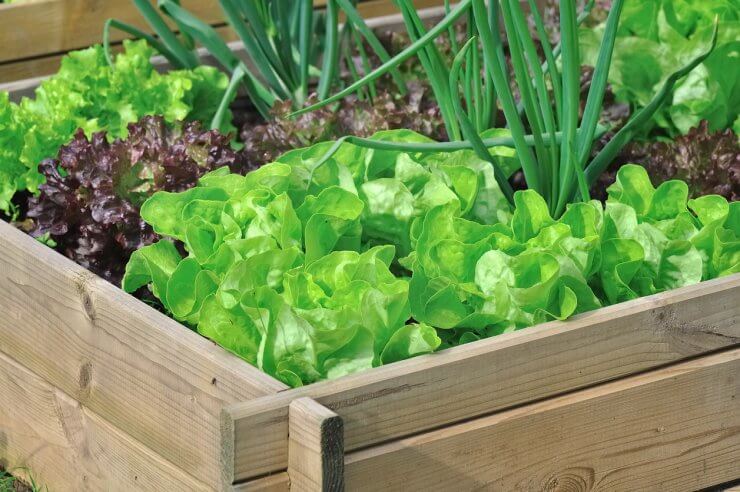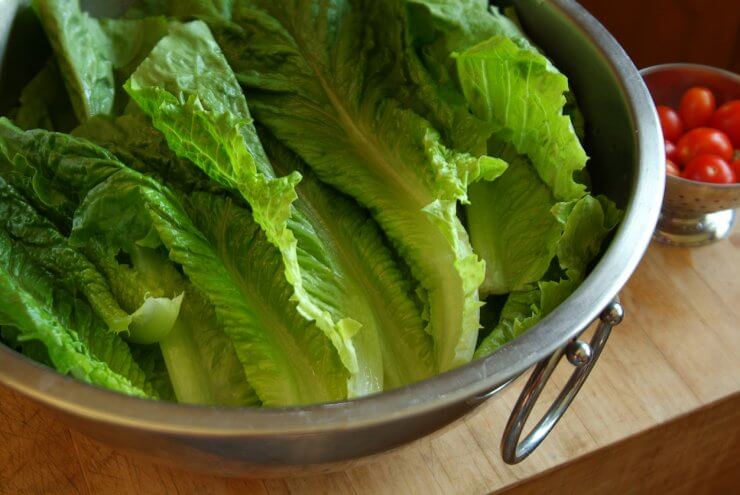
I love lettuce. It’s so easy to grow, it’s ready to harvest pretty quickly, and the multitude of varieties have so many different qualities. Who can deny the appeal of crunchy, slightly sweet lettuce on a sandwich? I also admit there’s something that bugs me: How does lettuce get E. coli?
It seems every year there’s a recall of lettuce. And while those are from big agricultural producers, it still makes me wonder a little about the lettuce in my garden. In fact, my dirty little secret is that I tend to toss a lot of lettuce because it often looks off, or gets pooped on. I prefer to grow my lettuce indoors in my hydroponic system.
Discover 7 top tips for growing, harvesting, and enjoying tomatoes from your home garden—when you access the FREE guide The Best Way to Grow Tomatoes, right now!

How does lettuce get E. coli, and what can a gardener do about it?
You aren’t going to like this, but the strain of E. coli that we’re talking about here only comes from one place: animal poop. And there are several ways that poop can end up on your lettuce.
In areas with large, industrial farms, there is often a mix of vegetable farming and animal farming. Even if they are separate facilities, it’s not difficult for runoff from, say, a dairy farm to end up in the water source that a vegetable farm may use for irrigation. Furthermore, since lettuce grows low to the ground, it’s much easier for contaminated soil to splash onto the leaves.
Additionally, there are so many points of contact where a pathogen could get introduced. The lettuce gets harvested, moved to a processing facility, packed in a box, and moved in the back of a truck all across the country. Then it goes to a warehouse or a grocery store where it’s unpacked and handled again. And then, finally, we take it home, give it a rinse, and eat it raw.
But how does lettuce get E. coli even if you wash it? Interestingly, the E. coli bacteria and the rough surface of lettuce leaves are practically made for each other. They’re like velcro, making it exceedingly difficult to wash the bacteria from lettuce leaves.
Obviously, that’s a much different trajectory than the lettuce growing in your backyard. But think back a moment to the animal poop. Depending on your gardening practices and where your garden is located, this could still be an issue.
One of the biggest possible avenues for contamination comes from using uncomposted manure as fertilizer. The extension program at Colorado State University recommends that your compost reach an internal temperature of “130-140 degree F for at least two 5-day heating cycles.” Even then, they suggest letting the manure cure for two to four months before you use it.
Another possible point of contamination is runoff from neighbors or your property if there are any animals present. If this is the case, you may need to divert the flow of water, so it bypasses your garden. It’s worth noting the location of your compost pile, as well, and making sure it’s not near your garden or your water supply.
Vertical gardening is another possible solution since E. coli often comes from soil. And, of course, keep your gardening tools clean.
My personal preference, however, is to grow lettuce indoors in a hydroponic garden, it pretty much eliminates the likelihood of pathogens like E. coli, and you can grow it for months on the same single seed.
What steps do you take to keep your garden vegetables safe from bacteria like E. coli?
Discover 7 top tips for growing, harvesting, and enjoying tomatoes from your home garden—when you access the FREE guide The Best Way to Grow Tomatoes, right now!





Does hydoponic grown lettuce etc. have the same nutrition as that grown in earth?
Yes – your hydroponic lettuce should be just as nutritious as soil-grown lettuce.
Can cat poop contaminate my Avacado Tree . They pop near it . It’s approximately 20 ft. high and is fruiting now .
I don’t think that contaminants from cat poop will be absorbed and transferred to your avocado fruit. However, heavy amounts of urine could affect the ph balance of your soil and that could become a problem over time. You might consider making the soil around the tree less cat “friendly” – by spraying with a citrus or peppermint oil, or putting down a barrier of chicken wire, prickly pine cones or even stones. Good luck.
Can I rinse with vinegar before we eat lettuce and vegetables?
E coli isn’t the only thing that can make one sick from veggies and fruit raised in your garden. Salmonella can become present from bird poop. So be sure and wash your veggies well before consuming. If that white poop is present, toss it!
Did not think of this. Thanks!!!!